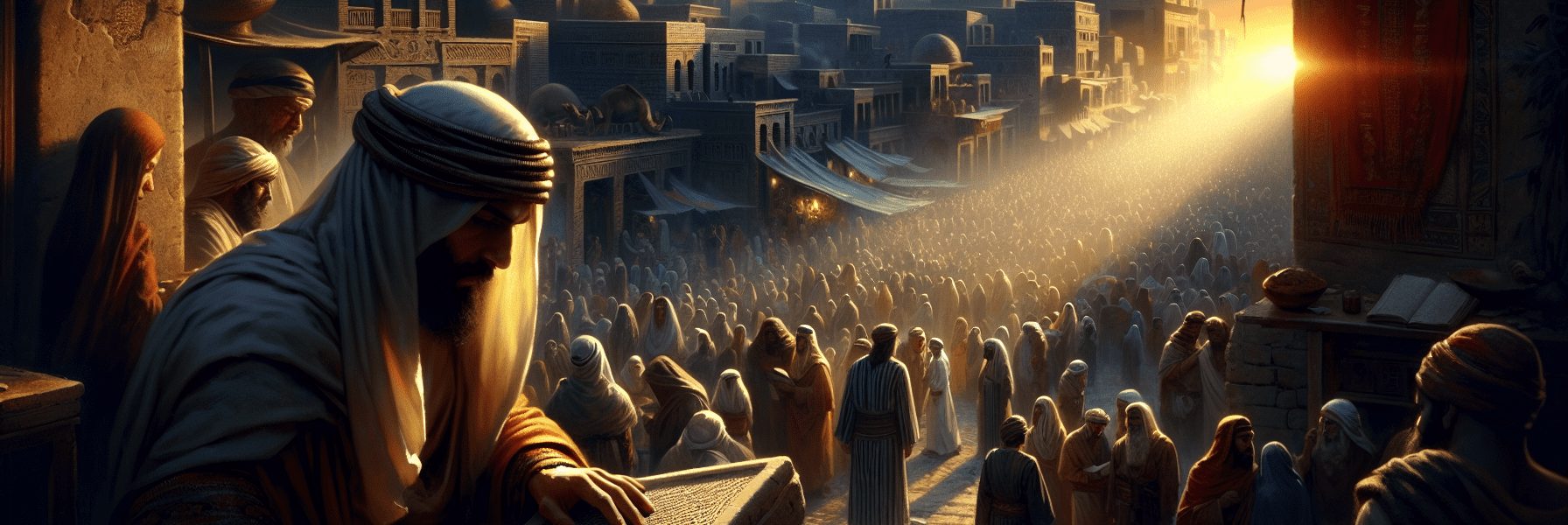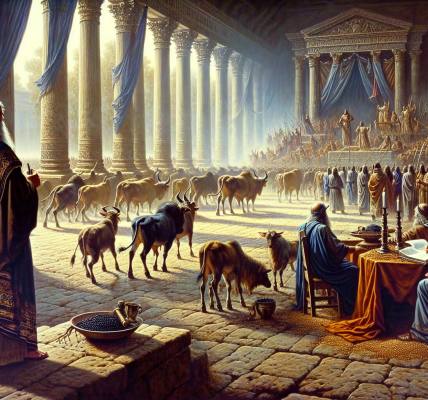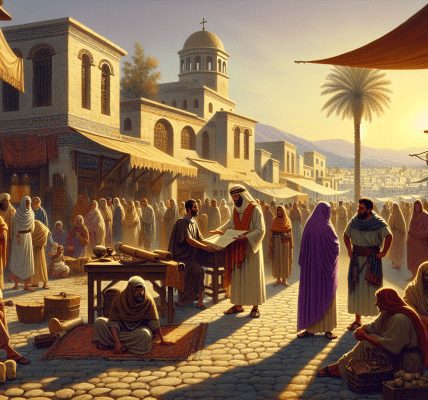**The Letter of Hope: A Story Based on Jeremiah 29**
The sun hung low over the city of Babylon, casting long shadows across the bustling streets. The air was thick with the scent of foreign spices and the hum of a thousand voices speaking in a tongue that still felt strange to the ears of the exiled Israelites. They had been torn from their homeland, their beloved Jerusalem, and brought to this sprawling empire as captives. The once-proud people of Judah now lived as strangers in a foreign land, their hearts heavy with grief and their spirits weighed down by uncertainty.
Among the exiles was a man named Elkanah, a scribe who had once served in the courts of Jerusalem. He sat in his modest dwelling, a clay tablet in his hand, his fingers tracing the words etched into its surface. The tablet bore a message—a letter from the prophet Jeremiah, sent from Jerusalem to the exiles in Babylon. Elkanah had read it countless times, but each time he did, the words seemed to stir something deep within him, a flicker of hope in the midst of despair.
The letter began with a command from the Lord, spoken through Jeremiah: *”Build houses and settle down; plant gardens and eat what they produce. Marry and have sons and daughters; find wives for your sons and give your daughters in marriage, so that they too may have sons and daughters. Increase in number there; do not decrease.”* (Jeremiah 29:5-6)
Elkanah closed his eyes, imagining the scene. He could see the exiles, once paralyzed by fear and longing for their homeland, now building homes with their own hands. He saw them tilling the soil, planting seeds, and tending to gardens that would one day yield fruit. He saw young men and women marrying, their laughter echoing through the streets of Babylon as they began new families. The Lord was calling them to live—not just to survive, but to thrive, even in exile.
The letter continued: *”Also, seek the peace and prosperity of the city to which I have carried you into exile. Pray to the Lord for it, because if it prospers, you too will prosper.”* (Jeremiah 29:7)
Elkanah pondered these words. Seek the peace of Babylon? Pray for the prosperity of their captors? It seemed counterintuitive, even absurd. Yet, as he reflected, he began to understand. The Lord was not merely instructing them to endure their exile; He was calling them to be agents of His grace in a foreign land. By seeking the welfare of Babylon, they would become a light to the nations, a testament to the faithfulness of God even in the midst of hardship.
The letter then turned to a warning against false prophets. *”Do not let the prophets and diviners among you deceive you. Do not listen to the dreams you encourage them to have. They are prophesying lies to you in my name. I have not sent them,” declares the Lord.* (Jeremiah 29:8-9)
Elkanah’s brow furrowed as he recalled the words of Hananiah, a self-proclaimed prophet who had recently stood in the square, declaring that the exile would last only two years. Hananiah had spoken with such confidence, his words like honey to the ears of the weary exiles. But Jeremiah’s letter exposed the truth: Hananiah’s promises were empty, his visions false. The Lord had not sent him. Elkanah felt a pang of sorrow for those who had been led astray, but also a renewed determination to hold fast to the true word of the Lord.
The letter concluded with a promise—a promise that stirred Elkanah’s soul like a trumpet blast: *”For I know the plans I have for you,” declares the Lord, “plans to prosper you and not to harm you, plans to give you hope and a future. Then you will call on me and come and pray to me, and I will listen to you. You will seek me and find me when you seek me with all your heart.”* (Jeremiah 29:11-13)
Tears welled in Elkanah’s eyes as he read these words. The Lord had not abandoned them. Even in Babylon, even in exile, He was with them. His plans were not thwarted by the might of empires or the schemes of men. He was still sovereign, still faithful, still working for their good.
Elkanah rose from his seat and stepped outside, the clay tablet clutched tightly in his hands. The sun had set, and the first stars were beginning to appear in the night sky. He looked up, his heart swelling with gratitude and hope. The Lord had promised to bring them back to Jerusalem, not in their timing, but in His. Seventy years—a lifetime for many—but the promise was sure. The Lord would fulfill His word.
As Elkanah stood there, a young boy approached him, his face eager. “What does the letter say, Master Elkanah?” the boy asked.
Elkanah knelt down, placing a hand on the boy’s shoulder. “It says that the Lord has not forgotten us,” he replied, his voice steady. “It says that He has plans for us—plans for good, not for harm. It says that one day, we will return to Jerusalem, and the Lord will restore us.”
The boy’s eyes widened. “When will that be?”
Elkanah smiled. “In the Lord’s time, my child. But until then, we must live here, in Babylon. We must build homes, plant gardens, and seek the peace of this city. And we must trust in the Lord, for He is faithful.”
The boy nodded, his young heart taking in the words. Elkanah stood and looked out over the city, its lights flickering like stars on the earth. Babylon was vast and powerful, but the Lord was greater still. And in His hands, even exile could become a place of hope, a season of preparation for the fulfillment of His promises.
As the night deepened, Elkanah returned to his dwelling, the letter of Jeremiah resting on the table before him. He bowed his head and prayed, his heart full of gratitude and anticipation. The Lord had spoken, and His word would not return void. In the midst of exile, there was hope. In the midst of uncertainty, there was a future. And in the midst of Babylon, there was the presence of the Lord.




